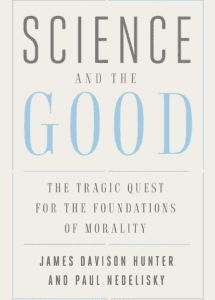 James Davison Hunter and Paul Nedelisky tackle the cultural trend (if not more) of thinking we can resolve our moral debates by greater science. Their book is called Science and the Good: The Tragic Quest for the Foundations of Morality.
James Davison Hunter and Paul Nedelisky tackle the cultural trend (if not more) of thinking we can resolve our moral debates by greater science. Their book is called Science and the Good: The Tragic Quest for the Foundations of Morality.
Important to their discussion is tracing the history of how morality moved away from tradition and revelation toward what could be established apart from God, apart from revelation, apart from tradition — that is, toward a “scientific” basis for morality.
Let me pause to say something here: one of the biggest issues today in the church is making moral decisions. How such decisions are made is rarely perceived for its importance by many, and increasingly we see moral decisions based on experiential preference or on sociological reasoning, which was all anticipated in the history Hunter and Nedelisky trace. I’m finding this book far more “relevant” than I expected.
Ideas don’t appear out of thin air. They neither surface in discourse nor fade from collective memory of their own accord, but arise, take shape, and find expression under specific social and historical conditions. Ideas are always situated in society and history in ways that make them more or less plausible, more or less persuasive. This is clearly the case for the idea that science could be a foundation for morality.
The Enlightenment’s approach to morality was provoked by the following three themes in history:
These challenges included: (1) the inability of old ways of knowing—philosophy, religious authority—to resolve exploding moral and political conflict; (2) a need for a convincing basis for shared international trade laws as global commerce swelled and broadened; (3) a sense that the world was bi er and more complex—in terms of natural, cultural, and moral phenomena—than older medieval conceptions could account for.
To many, situated as they were at the height of the Scientific Revolution, the solutions to these challenges would be found in the methods of science.
Pause here to read the following paragraph and then realize the radical difference when we get to Hume and Locke below.
The Backdrop: Aristotelian Scholasticism … As a rule, the scholastics sought to understand reality for the purpose of contemplation. Their goal was less to make discoveries and more to understand the things of this world with which they were already familiar. Any given phenomenon was thought to be explainable by identifying four kinds of causes (or explanations), originally postulated by Aristotle, that together make up a complete explanation. These causes were the material, the efficient, the formal, and the final.
The heritage passed down from scholasticism, then, located the source of morality in God, and his moral laws allegedly were revealed in the essences and purposes of things.
Enter again the three points above: “(1) the inability of old ways of knowing—philosophy, religious authority—to resolve exploding moral and political conflict; (2) a need for a convincing basis for shared international trade laws as global commerce swelled and broadened; (3) a sense that the world was bi er and more complex—in terms of natural, cultural, and moral phenomena—than older medieval conceptions could account for.”
Religious conflict in Europe demanded ethical systems capable of overcoming disagreement, and contemplative, academic scholasticism began to seem impractical as a foundation for a common legal culture capable of adjudicating complex and competing economic interests.
And I would add that the wars by the religious parties made their religious party less credible.
Enter Science: Francis Bacon’s inductive method, the promise of mathematics with Descartes and then with Isaac Newton as something that had predictive powers and deep credibility, the transfer of mathematics to scientific knowledge and its possibilities … these made hope in science important.
In sum, optimism about the new science was grounded in its success in discovering facts about the world, its usefulness to a large range of problems, its intelligibility compared to often obscure scholastic metaphysics, and its potential for resolving longstanding disagreements through physical experimentation and proof. But the new science also generated optimism because it offered evidence—often in the form of widely observable experiments—that some of scholasticism’s most important statements about the natural world were simply false.
Faith grounded morality lost its power.
As the authority of scholasticism began to wane, so did the credibility of ethical accounts grounded in Christian theology.
Hence the search for a common morality, a scientifically shaped morality, a morality established for all on the basis of reason, common sense, and empiricism.
Hugo Grotius and rights.
Thomas Hobbes, human nature and the need for consensus established social principles.
John Locke and his empiricist epistemology that led morals to be behaviors that bring us rewards and evils as that which led to punishments.
Leading to this concluding summary:
An important shift had taken place in their understanding of the ends or purposes of morality. For ages, it was taken that the highest end of humanity was to contemplate God and to perfect the natures of individuals, both alone and in society, in accordance with divine intention. Moral law comprised the principles that tended toward the fulfillment of these ends. But these teleological ideals had been abandoned by the new philosophy. Now the end of morality was happiness in this life, rather than union with God or perfection of a God-given telos. A worldly, secular ethics grounded in a broadly naturalistic foundation was replacing an otherworldly, theologically based ethics.











